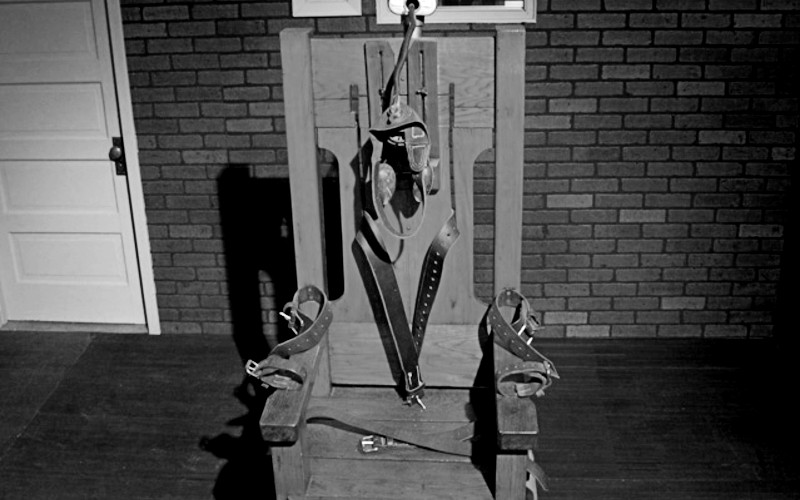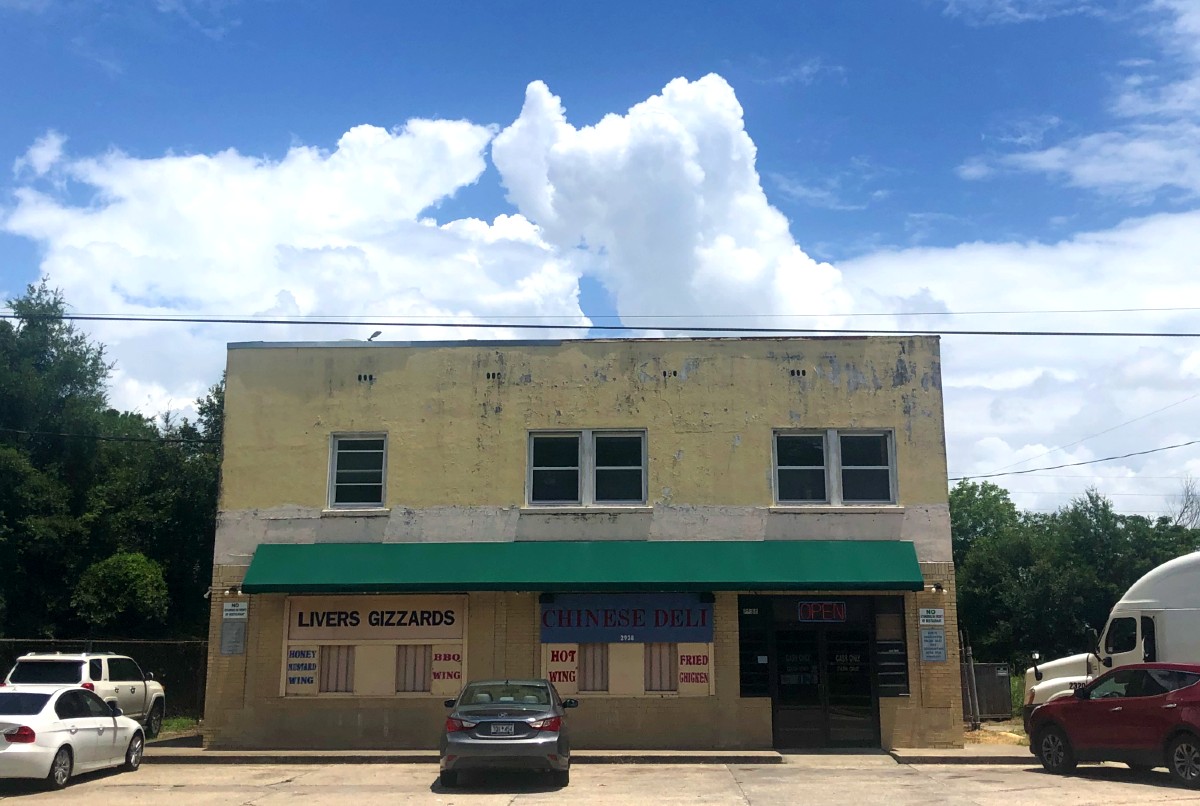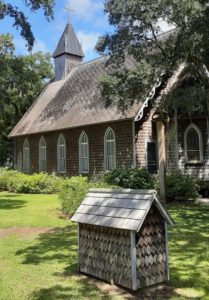STATEHOUSE REPORT | ISSUE 20.29 | JULY 16, 2021
BIG STORY: State scrambles again to develop new execution method
MORE NEWS: Cunningham says S.C. should legalize marijuana
LOWCOUNTRY, Ariail: Trying to reach you
COMMENTARY, Brack: Republicans should work to expand, not restrict, voting
SPOTLIGHT: Palmetto Care Connections
FEEDBACK: Salary column may be justified, except for Corrections director
MYSTERY PHOTO: Livers and gizzards
State scrambles again to develop new execution method

By Sam Spence, special to Statehouse Report | More than a century after South Carolina turned to a relatively new technology to execute people by electrocution, state officials are still trying to figure out the best way to end the lives of citizens sentenced to die at the hands of the government.
A new option for which there are no rules yet: a firing squad.
“We’re looking at best practices and what’s been done in other places to create our policies and procedures,” department spokesperson Chrysti Shain told the Charleston City Paper.
South Carolina law gives condemned criminals the ability to choose the method by which they will die. Until this year, the default was lethal injection. Death by the electric chair was the second option. But as public support for capital punishment waned, pharmaceutical companies became unwilling to ship the deadly cocktail of drugs to states needed to end a life.
After a decade of clamoring to figure out how to restart executions, South Carolina legislators finally passed a bill this year that reconfigured the state’s death penalty rules. Electrocution is now the state-endorsed execution method if lethal injection isn’t available. The new law introduced the third option, death by firing squad.
With an amended statute nominally in place, state-retained lawyers notified the S.C. Supreme Court on May 19 that the state Department of Corrections “is now able to carry out executions by electrocution.”
Brad Sigmon, convicted of a 2002 double murder in Greenville County, was the first scheduled. But with lethal injection unavailable and the state’s new firing squad not yet assembled, the high court vacated Sigmon’s execution order.
Executions seem unlikely until the firing squad policy is in place. It is, however, on the way.
A look back more than a century
Letters filed in federal court by Sigmon’s attorneys show South Carolina’s state electrician seeking basic guidance soon after the state adopted execution by electrocution from his counterpart in Massachusetts.
 “I will appreciate any literature or drawings of your chair and electric apparatus, also of the death chamber,” Tench Boozer wrote in March 1912 to the Massachusetts state electrician.
“I will appreciate any literature or drawings of your chair and electric apparatus, also of the death chamber,” Tench Boozer wrote in March 1912 to the Massachusetts state electrician.
S.C. purchased its new electric chair in May 1912 from New Jersey-based Adams Electric Company at a cost of $2,800, according to The (Charleston) News and Courier. The apparatus required additional electricity at the penitentiary when power itself was still relatively scarce — some rural areas of South Carolina would not be electrified for 20 more years.
By all accounts, the chair purchased in 1912 is the same one used today, though some electrical components have been updated.
Boozer was appointed to his post in 1911 by Gov. Coleman Blease, notorious in his own time as an amoral demagogue. Blease’s naked populist appeals to middle-class white mill workers and urban anti-prohibitionists alike turned off even Ben Tillman, the violent, virulent former governor and U.S. senator.
And while lynching and state factories devoid of health and safety laws were OK in Blease’s book, death by hanging at the hands of the state was just too much.
“It seems to me that this is a much more humane manner of execution than the barbaric form of hanging,” Blease wrote to lawmakers Jan. 9, 1912, according to The News and Courier.
The law swapping the electric chair for the gallows was later hailed in the paper as “one of the most important measures passed by the General Assembly in many years.”
The day South Carolina’s new execution law was passed, two men were sentenced to death by electrocution. By June, there would be at least four others, according to news reports. Five were Black, one white.
Many of those disparities are still with us today. More than half of South Carolina’s 37 death row inmates are Black, according to the Department of Corrections, while Black South Carolinians make up just 27 percent of the population.
Execution protocols
Access to current state execution protocols is “restricted,” Shain told the City Paper. But 2002 procedures also marked “Restricted” — obtained as part of a Freedom of Information Act request and filed in federal court by Sigmon’s attorneys — mapped out, down to the minute, how executions were carried out in the Palmetto State at that time.
On the day of their execution, inmates set to die by electrocution had their head and lower-right leg shaved, took a shower and wore pants cut off at the knee (to ensure contact with conducting strips on the chair). Once inside the execution chamber, the inmate was strapped in and outfitted with a leather cap studded with a brass electrode and lined with copper mesh and a sponge soaked in ammonia chloride.
At the appointed time, three executioners chosen from SCDC employee volunteers stand behind a one-way mirror facing the condemned inmate. Each pushes a red button at the far end of the room. All three buttons are capable of starting the deadly 2,000-volt cycle, according to another SCDC document, “but only one is active during an execution” — a psychological sleight of hand.
Rules for South Carolina’s new alternative, the firing squad, are being modeled after three states that still use firing squads, including Utah. There, five firing squad officers stand 25 feet from an offender. Each gets a loaded rifle. One is blank, so no one knows who will fire the fatal bullet.
“A punitive culture”
From her time as a criminal defense attorney, Cameron Blazer of Mount Pleasant describes a “deeply punitive” justice system that prioritizes retribution over prevention.
“I, every day, am up against that punitive culture in our criminal justice laws and in the environment of criminal justice. And it extends far beyond the most serious part of criminal punishment,” Blazer told the City Paper.
Gov. Henry McMaster noted the adjusted state law could be some consolation to victims’ families and loved ones.
“This weekend, I signed legislation into law that will allow the state to carry out a death sentence. The families and loved ones of victims are owed closure and justice by law. Now, we can provide it,” he tweeted recently
But that closure may still be elusive, Blazer said, with each death penalty case drawing close scrutiny and challenges.
“The finality that people desperately seek, when they have been through an awful tragedy, is not going to come to them in any speedy fashion through the death penalty, nor can it or should it, given how bad we are at imposing it.”
An earlier and longer version of this story first appeared in the Charleston City Paper, where Spence serves as editor. Have a comment? Send to feedback@statehousereport.com
Cunningham says S.C. should legalize marijuana

Staff reports | Former U.S. Rep. and current Democratic gubernatorial candidate Joe Cunningham of Charleston this week pushed for recreational and medicinal legalization of marijuana at the state level.
“It’s time for elected officials to admit that what we are doing has not been working although there are career politicians who would rather live in the past,” the 39-year-old Cunningham said in a veiled reference to GOP Gov. Henry McMaster, 74.
Cunningham went on to say marijuana legalization is no longer a matter of looking to the future, but of catching up to the present. Marijuana is fully legal in 18 states, including Virginia. And 37 states, including Alabama and Mississippi, have legalized or voted in favor of medicinal marijuana.

Cunningham leaned heavily on the benefits of medical marijuana use for those with chronic illness, specifically veterans suffering from post-traumatic stress disorder, in his advocacy for cannabis. But he also said tax revenue from marijuana sales could bolster the state’s ability to fund infrastructure and education.
“We owe this to our men and women who have served our country; we owe it to those who suffer through chronic illnesses who just want relief from their pain,” he said. “We owe it to communities of color who have been unfairly impacted by these archaic laws.”
His plan calls for the complete expungement of criminal records for those who were arrested and charged with possession of marijuana in South Carolina. However, marijuana legislation often raises red flags for law enforcement, who have been fighting the war on drugs for decades now.
“But let’s be clear,” said former U.S. attorney for South Carolina Bill Nettles, “Their title is law enforcement, not the whole promulgation. What we ought to be doing is asking law enforcement to get in their lane. It is a misnomer that law enforcement is lockstep behind making cannabis illegal.”
Cunningham said he is confident in his ability to work with conservative lawmakers in the statehouse to bring his plan into fruition, citing his two bills passed through a divided Congress and by a Republican president during his term in Washington D.C. And, he said, he has the numbers behind him.
“The people are no longer divided on this issue, it’s the politicians that haven’t come around,” he said.
Skyler Baldwin of the Charleston City Paper, a sister publication, first reported on this story here.
In other recent news:
![]() VIRUS UPDATE: S.C. to offer vaccines at state park entrances. South Carolina public health authorities will soon be offering coronavirus vaccines at the entrances to state parks. Both the one-shot Johnson & Johnson vaccine and the various two-shot options will be available. More: The Post and Courier. State officials say there’s also an alarming rise of virus cases in the state. More: AP News. Some 94 percent of new COVID-19 cases in S.C. affect unvaccinated, DHEC says, according to the Pickens County Courier, and there’s been a nearly 40 percent increase in COVID-19 hospitalizations, according to WCSC.
VIRUS UPDATE: S.C. to offer vaccines at state park entrances. South Carolina public health authorities will soon be offering coronavirus vaccines at the entrances to state parks. Both the one-shot Johnson & Johnson vaccine and the various two-shot options will be available. More: The Post and Courier. State officials say there’s also an alarming rise of virus cases in the state. More: AP News. Some 94 percent of new COVID-19 cases in S.C. affect unvaccinated, DHEC says, according to the Pickens County Courier, and there’s been a nearly 40 percent increase in COVID-19 hospitalizations, according to WCSC.
S.C. gets support of 20 other states in abortion lawsuit. Alabama and 19 other state attorneys general have filed an amicus brief in South Carolina’s defense of a new abortion law that would ban most procedures in the state. The filing argues that U.S. District Judge Mary Geiger Lewis overstepped her authority when she put the entire abortion law on hold, rather than just the portion being challenged. More: AP News
S.C. leading nation in fewer ex-felons returning to prison. Less than 22 percent of prisoners released from July 2016 to June 2017 have wound up back in prison, making the Palmetto State a national leader in putting ex-felons on the road to success. More: The Post and Courier
COLLEGES: Clemson elects first-ever woman to chair board of trustees. Clemson University has named a woman. banker Kim Wilkerson, to chair its board of trustees for the first time in the university’s 132-year history. More: The State.
-
- USC balks at renaming buildings, shifts focus for new: The Post and Courier
- S.C. State fires university president after enrollment drops: : SC Public Radio
- Lawmakers react to firing: The State.
Santee Cooper kicks off search for new CEO. The state-owned utility is starting to search for its next leader. More: The Post and Courier
S.C.’s Clyburn says Biden reworking filibuster rules. U.S. House Majority Whip Jim Clyburn of South Carolina is a longtime ally of President Joe Biden, a former U.S. senator. He told reporters Wednesday that Biden is likely working behind the scenes to push for Senate rule changes so the filibuster cannot be used on election law legislation or other changes. More: AP News | The Orangeburg Times & Democrat.
S.C. pharmaceutical company hopes to bolster U.S. medical supply chain. Nephron Pharmaceuticals Corp. in Lexington County is launching a $100 million expansion in a broader effort to develop a domestic medical supply chain. More: AP News | Columbia Business Report.
- Have a comment? Send to: feedback@statehousereport.com.
Trying to reach you

Cartoonist Robert Ariail always has an interesting take on what’s going on in South Carolina. His weekly “Lowcountry” strip is originally drawn for our sister publication, the Charleston City Paper. Love the cartoon? Hate it? What do you think: feedback@statehousereport.com. Check out the Best of Charleston 2021.
Republicans should work to expand, not restrict, voting

By Andy Brack, editor and publisher | Red states like South Carolina face increasing pressure to fiddle with election laws. They should resist.
 But expecting Republican leaders to dial back the rhetoric is hopeful at best, looney at worst. Why? Because of this: “These voter suppression efforts are based on a big lie that the election was stolen,” observed state Rep. Gilda Cobb-Hunter, D-Orangeburg. “Sadly, I have not heard one Republican elected official at the state or local level here, disavow the lie and admit that Joe Biden won the election fair and square.”
But expecting Republican leaders to dial back the rhetoric is hopeful at best, looney at worst. Why? Because of this: “These voter suppression efforts are based on a big lie that the election was stolen,” observed state Rep. Gilda Cobb-Hunter, D-Orangeburg. “Sadly, I have not heard one Republican elected official at the state or local level here, disavow the lie and admit that Joe Biden won the election fair and square.”
On Tuesday, Biden framed the election debate in a Philadelphia speech at the National Constitution Center as an unrelenting, modern Jim Crow attack on freedom:
“Hear me clearly: There’s an unfolding assault taking place in America today, an attempt to suppress and subvert the right to vote in fair and free elections, an assault on democracy, an assault on liberty, an assault on who we are as Americans,” Biden said.
This came during the same week that Texas House Democrats fled their state to avoid restrictive voting measures being passed. Without them there for a quorum to conduct legislative business, no votes can happen. They say they’ll stay out of the state until the session expires early next month.
In Philadelphia, Biden renewed a push for Congress to deal with attacks on the election process by passing federal legislation to protect voting.
According to the Brennan Center for Justice, legislators across the country filed 389 bills this year to restrict voting, such as measures to make it more difficult to register, cast ballots by mail and vote in-person. Most tend to be in red states. But there also have been some 880 bills filed, mostly in blue states, on everything from increasing early voting opportunities, making it easier to vote by mail and protecting access at polling places.
The Brennan Center includes 17 South Carolina bills in its tally but the nonpartisan League of Women Voters of South Carolina says there are actually 44 bills in the hopper dealing with elections and voting.
So far, no major restrictive legislation has passed in South Carolina. But there are forces at work to tamper with election laws here, just like in Texas.
First, state lawmakers are all but certain to finish with H. 3444, a bill that will change the S.C. Election Commission by allowing the legislature to have a say on who sits on the board. Currently, the state’s governor makes appointments with members from both parties, but the bill would split appointments between the governor and legislature, which critics say would lead to a more partisan commission. Both chambers have passed versions of the bill, which likely will find compromise soon.
Second, be on the lookout for the myth of dead people voting. No real case has turned up in South Carolina for years, but that isn’t keeping conservative activists from spewing nationally-generated talking points about a grand scheme to vote dead people.
About 10 years ago came allegations that more than 950 dead voters cast ballots in South Carolina. The result: a state law enforcement investigation found claims completely baseless. And it’s not hard to figure out why — such a conspiracy is virtually impossible to pull off — thanks to the very voter identification requirements that the GOP insisted upon.
 “The only two cases of dead voter fraud reported nationally in 2020 were immediate relatives of the deceased who had access to protected personal information,” said the LWVSC’s Lynn Teague in June 30 written testimony to a S.C. House committee. “One was a gentleman who voted in the name of his wife after he murdered her.”
“The only two cases of dead voter fraud reported nationally in 2020 were immediate relatives of the deceased who had access to protected personal information,” said the LWVSC’s Lynn Teague in June 30 written testimony to a S.C. House committee. “One was a gentleman who voted in the name of his wife after he murdered her.”
Don’t fall victim to the fear that’s being spread about our election system. Those trying to convince you that it’s broken are scurrying to hold onto power as America’s demographics change. Unfortunately, they’re also working to harm our democracy, not make it better.
- Have a comment? Send to: feedback@statehousereport.com.
Palmetto Care Connections
 Statehouse Report is brought to you at no cost thanks to the generous support of underwriters, such as Palmetto Care Connections.
Statehouse Report is brought to you at no cost thanks to the generous support of underwriters, such as Palmetto Care Connections.
Established in 2010, Palmetto Care Connections (PCC) is a non-profit organization that brings technology, broadband and telehealth solutions to health care providers in rural and underserved areas in South Carolina. PCC hosts the Annual Telehealth Summit of South Carolina presenting state and national best practices and trends, as well as providing networking connections for health care, technology and broadband professionals.
The leader of the South Carolina broadband consortium, PCC assists health care providers in receiving broadband savings through the Federal Communication Commission’s Healthcare Connect Fund program. Since 2013, PCC has helped providers save more than $25 million in broadband costs.
PCC co-chairs the South Carolina Telehealth Alliance, along with the Medical University of South Carolina, serving as an advocate for rural providers and partnering with organizations to improve health care access and delivery for all South Carolinians.
- Learn more about Palmetto Care Connections.
Salary column may be justified, except for prison director
To the editor:
![]() Perhaps criticism of the large pay raises given several agency heads is justified, but no criticism should be leveled against the salary hike given state Corrections Department Executive Director Bryan Stirling. Look back at recent new stories regarding problems at the state prisons: smuggled contraband, riots, employee security breaches, understaffing, the capital punishment debate, the pandemic. Worst of all is the General Assembly’s decades-long neglect of the prison systems through underfunding. The list goes on.
Perhaps criticism of the large pay raises given several agency heads is justified, but no criticism should be leveled against the salary hike given state Corrections Department Executive Director Bryan Stirling. Look back at recent new stories regarding problems at the state prisons: smuggled contraband, riots, employee security breaches, understaffing, the capital punishment debate, the pandemic. Worst of all is the General Assembly’s decades-long neglect of the prison systems through underfunding. The list goes on.
As a volunteer coordinator for an inmate reading program, I’ve often wondered why Bryan Sierling has stayed as Corrections. As an attorney, he probably could make more money at a law firm. With the exception of Christy Hall, none of the other agency heads receiving pay boosts face the daily problems that Bryan Stirling does. Who would want a job that generates that many headaches?
— Sally Huguley, Columbia, S.C.
School superintendents paid too much, too
To the editor:
Enjoyed the column today. Have you ever looked into the salaries paid to local S.C. school superintendents? It’s obscene.
A few years ago while Florence County District 1 was interviewing for a new superintendent, I wrote a letter to the editor of the Morning News, pointing out that the authorized salary would exceed that of the governor and the chief justice of the S.C. Supreme Court. It also exceeded the pay of most heads of S.C. technical colleges and, I think, even some of the smaller four-year colleges. Here’s a link to the state average.
— Michael J. Young, Florence, S.C.
Send us your thoughts. We receive a few comments a week and look forward to publishing. But often we can’t because we can’t verify the identity of the writer. To be published, you’ve got to provide us with contact information so we can verify your letters. Verified letters to the editor are published weekly. We reserve the right to edit for length and clarity. Comments are limited to 250 words or less. Please include your name and contact information.
- Send your letters or comments to: feedback@statehousereport.com
Livers and gizzards

You can pretty much guarantee that this building wouldn’t be found outside of the South. This one is in South Carolina, but where? Send your guess to feedback@statehousereport.com — and remember to include your name, home city and contact information.
 Last week’s mystery, “Rear view,” was provided by longtime reader Don Clark of Hartsville. It shows the 1890s-era St. James-Santee Episcopal Church in McClellanville.
Last week’s mystery, “Rear view,” was provided by longtime reader Don Clark of Hartsville. It shows the 1890s-era St. James-Santee Episcopal Church in McClellanville.
Among those who identified the church were Elizabeth Jones and Jay Altman, both of Columbia; Bill Segars of Hartsville; Allan Peel of San Antonio, Texas; George Graf of Palmyra, Va.; and Jacie Godfrey of Florence.
Segars said the chapel of ease was a “40’X60′ Carpenter Gothic style building built by Paul B. Lucas in 1890 for a cost of $560. Alexander Hume Lucas designed the building, which is covered with hand drawn black cypress shingles.”
Peel shared, “According to an article in the SC Picture Project here … ‘it was the sixth church built within the St. James-Santee Parish and became the primary church after the Civil War, when rice plantations along the Santee, which depended upon slave labor, were abandoned and former planters moved to more central locations such as McClellanville.’”
- Send us a mystery. If you have a photo that you believe will stump readers, send it along (but make sure to tell us what it is because it may stump us too!) Send to: feedback@statehousereport.com and mark it as a photo submission. Thanks.
ORDER NOW: Copies are in Lowcountry-area bookstores now, but if you can’t swing by, you can order a copy online today.
ABOUT STATEHOUSE REPORT
Statehouse Report, founded in 2001 as a weekly legislative forecast that informs readers about what is going to happen in South Carolina politics and policy, is provided to you at no charge every Friday.
- Editor and publisher: Andy Brack, 843.670.3996
Donate today
We’re proud to offer Statehouse Report for free. For more than a dozen years, we’ve been the go-to place for insightful independent policy and political news and views in the Palmetto State. And we love it as much as you do.
But now, we can use your help. If you’ve been thinking of contributing to Statehouse Report over the years, now would be a great time to contribute as we deal with the crisis. In advance, thank you.
Buy the book
Now you can get a copy of editor and publisher Andy Brack’s We Can Do Better, South Carolina! ($14.99) as a paperback or as a Kindle book ($7.99). . The book of essays offers incisive commentaries by editor and publisher Andy Brack on the American South, the common good, vexing problems for the Palmetto State and interesting South Carolina leaders.
More
- Mailing address: Send inquiries by mail to: P.O. Box 21942, Charleston, SC 29413
- Subscriptions are free: Click to subscribe.
- We hope you’ll keep receiving the great news and information from Statehouse Report, but if you need to unsubscribe, go to the bottom of the weekly email issue and follow the instructions.
- Read our sister publications: Charleston City Paper (every Wednesday) | Charleston Currents (every Monday).
- © 2021, Statehouse Report, a publication of City Paper Publishing, LLC. All rights reserved.




Pingback: On the death penalty, marijuana and election rules – CBD News Insider